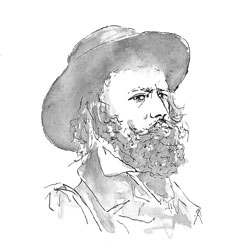Alfred, Lord Tennyson
Alfred Tennyson was born in 1809 at Somersby, Lincolnshire, the son of the Rector there. He was educated at Louth Grammar School. The Tennysons were a prominent but quarrelsome family, and he grew up in comfortable but not particularly wealthy circumstances. In 1827 he went to Trinity College, Cambridge. By the time he left in 1831, without taking a degree, he had already published his first collection, Poems, Chiefly Lyrical, and formed some very significant friendships. One was with Arthur Henry Hallam, another poet, whose death in 1833 was a huge blow. He was very productive throughout the 1830s and 1840s (after leaving university). It was not until later, however, in 1850, that two highly significant events secured his reputation and his financial security. He published In Memoriam, one of the greatest English poems about grief, loss, and consolation, and he was named Poet Laureate, succeeding Wordsworth. Queen Victoria held him in high regard. He was admitted to the peerage, becoming Baron Tennyson (hence he is often referred to as 'Alfred, Lord Tennyson') in 1883. He died in 1892.
In addition to In Memoriam Tennyson wrote fascinating and well-known poems in numerous collections. 'The Lotos-Eaters', 'Maud', 'Enoch Arden', 'Mariana', and 'Tithonus', to name just a few, would offer varied rewards to a reader exploring the range of his work. Another group of poems, telling the stories of King Arthur and his court, would be rewarding to consider. Tennyson's persistent interest in the court of King Arthur manifests itself both in early poems (such as 'The Lady of Shalott', and 'The Morte d'Arthur'), and in the great collection Idylls of the King.
The Cambridge Authors resources for Tennyson include an introduction to his Arthurian poems, as well as several articles that explore his life (especially at Cambridge) and the times he wrote in (for example, looking at the religious and scientific backgrounds, and his presentation of women). There are also close analyses of poems, and we hope you'll compare your interpretations with the ones set out there. You can find details of these in the menu on the left. Two large resources require a special mention. 'Music and Meaning' is about the musicality of poetry, the use of musical metaphor in Tennyson's work, and musical settings of his work: it covers a lot of ground, and asks many rewarding questions along the way. 'Tears, Idle Tears' uses one poem to ask a series of fundamental questions about how we read poems in relation to their historical contexts. It invites readers to evaluate several different approaches to one poem.
If you're looking for a good text of Tennyson's poems, two well-known editions deserve special mention. Christopher Ricks' Tennyson: A Selected Edition is published by Longman in a reasonably affordable paperback, which includes comprehensive notes. An edition of The Major Works in the Oxford World's Classics series, edited by Adam Roberts, is cheaper, and also includes extracts from Tennyson's letters and from Hallam Tennyson's memoir about his poet father.
